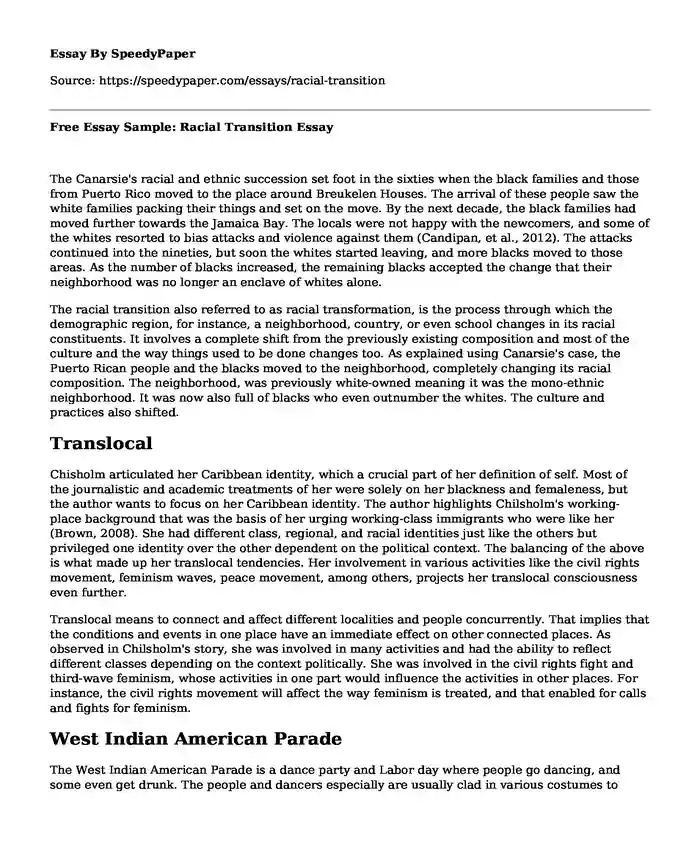
| Type of paper: | Essay |
| Categories: | Race Racism Multiculturalism Social change |
| Pages: | 3 |
| Wordcount: | 687 words |
The Canarsie's racial and ethnic succession set foot in the sixties when the black families and those from Puerto Rico moved to the place around Breukelen Houses. The arrival of these people saw the white families packing their things and set on the move. By the next decade, the black families had moved further towards the Jamaica Bay. The locals were not happy with the newcomers, and some of the whites resorted to bias attacks and violence against them (Candipan, et al., 2012). The attacks continued into the nineties, but soon the whites started leaving, and more blacks moved to those areas. As the number of blacks increased, the remaining blacks accepted the change that their neighborhood was no longer an enclave of whites alone.
The racial transition also referred to as racial transformation, is the process through which the demographic region, for instance, a neighborhood, country, or even school changes in its racial constituents. It involves a complete shift from the previously existing composition and most of the culture and the way things used to be done changes too. As explained using Canarsie's case, the Puerto Rican people and the blacks moved to the neighborhood, completely changing its racial composition. The neighborhood, was previously white-owned meaning it was the mono-ethnic neighborhood. It was now also full of blacks who even outnumber the whites. The culture and practices also shifted.
Translocal
Chisholm articulated her Caribbean identity, which a crucial part of her definition of self. Most of the journalistic and academic treatments of her were solely on her blackness and femaleness, but the author wants to focus on her Caribbean identity. The author highlights Chilsholm's working-place background that was the basis of her urging working-class immigrants who were like her (Brown, 2008). She had different class, regional, and racial identities just like the others but privileged one identity over the other dependent on the political context. The balancing of the above is what made up her translocal tendencies. Her involvement in various activities like the civil rights movement, feminism waves, peace movement, among others, projects her translocal consciousness even further.
Translocal means to connect and affect different localities and people concurrently. That implies that the conditions and events in one place have an immediate effect on other connected places. As observed in Chilsholm's story, she was involved in many activities and had the ability to reflect different classes depending on the context politically. She was involved in the civil rights fight and third-wave feminism, whose activities in one part would influence the activities in other places. For instance, the civil rights movement will affect the way feminism is treated, and that enabled for calls and fights for feminism.
West Indian American Parade
The West Indian American Parade is a dance party and Labor day where people go dancing, and some even get drunk. The people and dancers especially are usually clad in various costumes to celebrate the day, and it is a culture that has been carried forward to this generation (Kasinitz, 1998). The West Indian Parade came to Brooklyn in the 1930s through the staging of costumes in open places. The parade was moved there to celebrate Labor Day initially done by slaves, but it is a culture that has been upheld into the modern world and continues to be performed.
The parade has been instrumental in creating awareness of the West Indian identity that was the first people to start it. The people and various agencies finance it and make sure that it is performed yearly, showing the different cultures of workers from the West Indies.
References
Brown, T. L. (2008). " A New Era in American Politics": Shirley Chisholm and the Discourse of Identity. Callaloo, 31(4), 1013-1025.
Candipan, J., Cordeau, R., Peterson, M., Riordan, N., Peker, B., Shallow, D., & Smithsimon, G. (2012). Racial Transition and Neighborhood Stability in Brooklyn. The World in Brooklyn: Gentrification, Immigration, and Ethnic Politics in a Global City, 379.
Kasinitz, P. (1998). Community Dramatized, Community Contested: The Politics of Celebration in the Brooklyn Carnival. Island Sounds in the Global City: Caribbean Popular Music and Identity in New York, 93-113.
Cite this page
Free Essay Sample: Racial Transition. (2023, Jul 10). Retrieved from https://speedypaper.net/essays/racial-transition
Request Removal
If you are the original author of this essay and no longer wish to have it published on the SpeedyPaper website, please click below to request its removal:
- Essay Example: Terrorism in Israel and Algeria
- Essay Sample on Tense relationship
- Paper Exampl on Business Solutions for the Disabled
- Essay Sample on a Contemporary Healthcare Issue
- Essay Sample on Mental and Physical Disability
- Report on Journey Through Mozambique: Post-Independence Challenges, Frelimo's Rule, and International Dynamics
- Zero Tolerance for School Violence: Unraveling Causes and Advocating for a Safer Learning Environment
Popular categories




